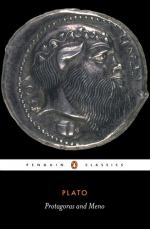|
This section contains 917 words (approx. 3 pages at 400 words per page) |

|
Section 3, line 87-95 Summary and Analysis
At this point, Socrates says that he is inclined to believe that the immortal souls retain knowledge of many things that only need to be remembered or recollected. By believing in this recollection of knowledge, at least the theory gives people more courage in the task of learning something and expanding their knowledge into an unknown area. Socrates decides to apply this theory of recollection to his and Meno's study of, what is virtue. Socrates makes a hypothesis of what virtue could be, or how to find it. Socrates makes the hypothesis that if virtue can be taught, it must be some kind of knowledge. In that way, he and Meno could discover if virtue is knowledge and then, it can be taught, or if it is something else, it cannot be taught.
If knowledge is needed...
(read more from the Section 3, line 87-95 Summary)
|
This section contains 917 words (approx. 3 pages at 400 words per page) |

|




